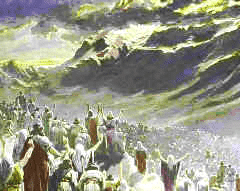Without suffering you cannot really learn obedience. Suffering is the very guarantee that obedience is not self-willfulness.
—Søren Kierkegaard, Eighteen Edifying Discourses (1843-44)
Obedience and Suffering
In George Orwell’s 1984, there is a moment when O’Brien lectures Winston on the nature of obedience and its relationship to suffering.
“How does one man assert his power over another, Winston?”
Winston thought. “By making him suffer,” he said.
“Exactly. By making him suffer. Obedience is not enough. Unless he is suffering, how can you be sure that he is obeying your will and not his own?”
Though Orwell’s context was tyranny and torture, he still understood something of the relationship between suffering and true obedience. The man who obeys his superior when the commands are easy and the requirements pleasant may simply be serving his own comforts and pleasures. Only when a man obeys in the midst of pain and suffering does he clearly do so from an obedient and submissive heart. As Kierkegaard wrote, “Suffering is the very guarantee that obedience is not self-willfulness.”
Israel in the Wilderness
 When the children of Israel came out of Egypt, God led them through the wilderness. There they faced hunger and thirst, weariness, and battle (Ex. 15—17). The wilderness was to be a short-term boot camp for that generation. But when Israel refused to enter the Promised Land, God sent His people back into the wilderness to wander for forty long years until the whole Exodus generation dropped dead—all except Joshua and Caleb (Num. 14). But what proved a graveyard for the older generation proved to be an extended and rather vigorous boot camp for the younger. When the forty years were up, Israel was finally ready to conquer the Promised Land as God’s people. Moses said this about the whole wilderness experience:
When the children of Israel came out of Egypt, God led them through the wilderness. There they faced hunger and thirst, weariness, and battle (Ex. 15—17). The wilderness was to be a short-term boot camp for that generation. But when Israel refused to enter the Promised Land, God sent His people back into the wilderness to wander for forty long years until the whole Exodus generation dropped dead—all except Joshua and Caleb (Num. 14). But what proved a graveyard for the older generation proved to be an extended and rather vigorous boot camp for the younger. When the forty years were up, Israel was finally ready to conquer the Promised Land as God’s people. Moses said this about the whole wilderness experience:
And thou shalt remember all the way which the LORD thy God led thee these forty years in the wilderness, to humble thee, and to prove thee, to know what was in thine heart, whether thou wouldest keep his commandments, or no. And he humbled thee, and suffered thee to hunger, and fed thee with manna, which thou knewest not, neither did thy fathers know; that he might make thee know that man doth not live by bread only, but by every word that proceedeth out of the mouth of the LORD doth man live. (Deut. 8:2-3)
Moses goes on to say that during those forty years, God provided for their most basic needs in a miraculous way. Their clothes didn’t wear out, and their feet didn’t swell from all the walking (v. 4). God never left them. Yet the wilderness was a time of discipline and chastening (v. 5). God led them through the wilderness so that He might humble them, prove them, and do them good (v. 16). God’s plans for Israel were always good. But great temptations lay ahead in the Promised Land—temptations to self-indulgence and self-sufficiency, temptations to forget God and trust human wisdom and strength (vv. 11-20). The wilderness was preparation, a time to practice obedience. John Piper observes, “The real testing ground of life is the promised land of prosperity. The wilderness is the boot camp, the land of milk and honey is where the battle for the heart is finally fought.” Those who will not submit to the discipline of boot camp will not be ready to fight for the Promised Land or enjoy it properly once the obvious battles are won.
Just as it was then, our journey through the wilderness prepares us for conquest and victory. It weans us away from our lusts and even our sinful longings for the things of this world. It teaches us to rely on God’s love and providence when all earthly supports have fallen away. It impresses upon us the wisdom of God’s laws and trains us in the habits of confident obedience. It teaches us that obedience to God’s word is more important than our comfort, even than our very lives. It prepares us to follow Jesus Christ.
Christ in the Wilderness
After His baptism and anointing, Jesus went into the wilderness to face the Tempter (Matt. 4; Luke 4). He was there for forty days and forty nights. There’s a nice connection here with Israel’s boot camp experience. But unlike Israel, Jesus was sinless. His heart was free from any lust or impurity. Still, He was (and is) truly human and, in His humanity, capable of learning and growing (Luke 2:52). The temptations He faced were real for Him in that He could feel the emotional and logical rationale that bated Satan’s barbed suggestions. After all, Jesus really was hungry—to the point of starvation, in fact. Wouldn’t the Father want Him to save Himself rather than let His mission miscarry? Satan’s power over the nations was a real threat (Rev. 13:2; 20:3). What if Satan were to back off a mite? No crosses, no stakes, no lions. Wouldn’t love want to spare His people those horrors? And what about the proposed leap of faith? A flamboyant jump from the Temple pinnacle would catch the attention of the multitudes, and the church growth movement could be easily ushered in.
But to each temptation Jesus replied with words from Deuteronomy, words that reflected His complete submission to His Father’s will (Deut. 8:3; 6:13, 16). He would only do God’s work God’s way. He wouldn’t go beyond His commission or cheat on its requirements or timetable, not even if the world itself were at stake. Through this submission in the wilderness, Jesus matured in righteousness and godliness. The writer of Hebrews says that “though he were a Son, yet learned he obedience by the things which he suffered” (Heb. 5:8). Jesus obeyed God when it was hard. He continued to persevere in such obedience on through Gethsemane and to the Cross itself. And so He set the pattern for our own obedience.
Self-Denial
Jesus said, “If any man will come after me, let him deny himself, and take up his cross daily, and follow me” (Luke 9:23). This self-denial is not of the Buddhist flavor. Jesus isn’t telling us to disbelieve in our own existence as individuals. He is calling us to abandon self-will, to seek first God’s glory and kingdom rather than our own desires or comforts, to love God with all our hearts. This requires faith in Christ and the power and discipline of the Holy Spirit. It is something we must do daily—even moment by moment.
John Calvin in his Institutes devoted several pages to this self-denial. He says in part:
The great point, then, is, that we are consecrated and dedicated to God, and, therefore, should not henceforth think, speak, design, or act, without a view to his glory…We are not our own; therefore, neither is our own reason or will to rule our acts and counsels. We are not our own; therefore, let us not make it our end to seek what may be agreeable to our carnal nature. We are not our own; therefore, as far as possible, let us forget ourselves and the things that are ours. On the other hand, we are God’s; let us, therefore, live and die to him (Rom. 14:8). We are God’s; therefore, let his wisdom and will preside over all our actions. We are God’s; to him, then, as the only legitimate end, let every part of our life be directed. (III, 7)
To Calvin, even reason was something that should be held captive to Christ. Echoing Calvin and Scripture, the Heidelberg Catechism says that my “only comfort in life and in death” is that I am “not my own, but belong to my faithful Savior, Jesus Christ” (Q&A I). For if I belong to Him, it is by sovereign grace and particular redemption. He has “fully satisfied for all my sins.” He will not let me perish (John 10:27-29). He will work all things for my good, even the wilderness—especially the wilderness. And if I can stand in the wilderness, then God’s grace in me is real. C. S. Lewis has Screwtape explain the matter in these words to his nephew:
Do not be deceived, Wormwood. Our cause is never more in danger than when a human, no longer desiring, but still intending, to do our Enemy’s will, looks round upon a universe from which every trace of Him seems to have vanished, and asks why he has been forsaken and still obeys. (39)
Conclusion
American culture is a culture of convenience, amusement, and self-indulgence. We don’t want hard things. We certainly don’t expect God to send hard things our way. But can’t we just name things and claim things? Not when God has promised His people just the opposite. Jesus told His disciples, “In the world ye shall have tribulation: but be of good cheer; I have overcome the world” (John 16:33). Hard things are indeed gifts from God’s. Like our Pilgrim forefathers, we need to receive these gifts in faith. And, as we move into Thanksgiving week, it’s a good time to be thankful for the hard times we’ve all had.
For Further Reading:
John Piper, “Can God Spread a Table in the Wilderness?”, (1981), <https://www.soundofgrace.com/piper81/112281m.htm>.
Bob Deffinbaugh, “Boot Camp and ‘C’ Rations (Exodus 16),” <https://bible.org/seriespage/boot-camp-and-%E2%80%9Cc%E2%80%9D-rations-exodus-16>.
C. S. Lewis, The Screwtape Letters (New York: Macmillan Publishing Company, 1961).
John Calvin, “The Sum of the Christian Life: Self-Denial,” in The Institutes of the Christian Religion (Grand Rapids: Wm. B. Eerdmans, 1970 [1559]).
Alex and Bret Harris, Do Hard Things: A Teenage Rebellion Against Low Expectations (Colorado Springs: Multnomah Books, 2008).
©2011 Off the Grid News










